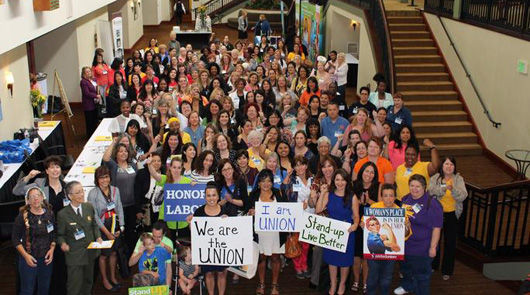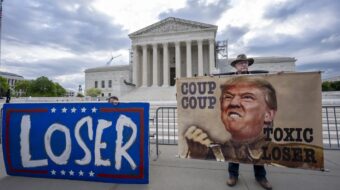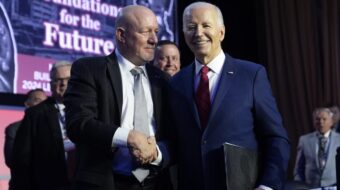
WASHINGTON – Sen. Bernie Sanders, I-Vt., a leading candidate for the Democratic nomination to the presidency, and Rep. Mark Pocan, D-Wis., introduced legislation yesterday that would bring U.S. labor law out of the dark ages and into the 21st century.
The bill, called the Workplace Democracy Act, allows workers to unionize through a simple majority card-check vote and, perhaps equally important, ensures that companies can’t stop a union from forming by denying a first contract.
“Card check” recognition, which unions and their allies call “majority sign-up,” is the key feature of the new bill. It was also part of the now-dead Employee Free Choice Act (EFCA) which labor and its allies began pushing ten years ago. A massive multi-billion dollar big business campaign and a Senate filibuster led by Republicans beholden to those businesses doomed the EFCA.
The Workplace Democracy Act, announced by AFL-CIO President Richard Trumka at a press session previewing today’s White House summit on workers’ rights, in addition to card check, would mandate mediation and arbitration between labor and management if the two sides fail to agree on a first contract following union recognition and certification.
The labor movement sees the new bill as the most significant chance workers have yet of literally re-writing the laws so that it will no longer be just corporations that determine the economic future of Americans.
“For tens of millions of American working people who live in poverty and every family on the wrong side of income inequality, the Sanders-Pocan legislation is our best road map to shared prosperity and a real chance at the American dream,” Trumka said today in Washington.
The announcement of the new bill follows the introduction last month of what the labor movement also considers an important bill – the WAGE Act introduced by Sen. Patty Murray, D-Wash., and Rep. Bobby Scott, D-Va. That legislation updates the National Labor Relations Act, which became law during the New Deal, by increasing workers’ legal protections when employers retaliate against them for speaking out on the job.
Reporters talking to Sanders about his bill pointed out that it had little chance of passage in the Republican-controlled Congress. Both Sanders and Pocan, his House co-sponsor who happens to be a member of the Painters’ union, said it had to be introduced anyway.
“Millions of Americans who want to join unions are unable to do so because of the coercive and often illegal behavior of their employers,” Sanders said. “The benefits of joining a union are clear: higher wages, better benefits and a more secure retirement. If we are serious about reducing income and wealth inequality and rebuilding the middle class, we have got to substantially increase the number of union jobs in this country.”
Card check recognition mandates the NLRB certify that a union represents workers if a simple majority of them sign valid authorization cards, rather than going through the time-consuming, often-delayed NLRB election process – which is open to employer abuse, manipulation, and labor law-breaking. The Sanders-Pocan bill also says that once the union is recognized, the firm must open bargaining with it within 10 days.
If they can’t agree on a pact within 90 days, the union or the bosses can seek compulsory mediation. If they still can’t agree after a month of that, they submit remaining issues to binding arbitration.
“For years, the ability of workers to unionize has given employees the opportunity to bargain for better wages and benefits. And unions have been one of our nation’s strongest voices for workplace safety and fairness. But over time, employers have steadily undermined workers’ ability to organize through nefarious tactics,” said a co-sponsor, Sen. Sherrod Brown, D-Ohio. “By allowing the use of the majority sign-up process and ensuring a timely contract.
Photo: AFL-CIO Now blog













Comments